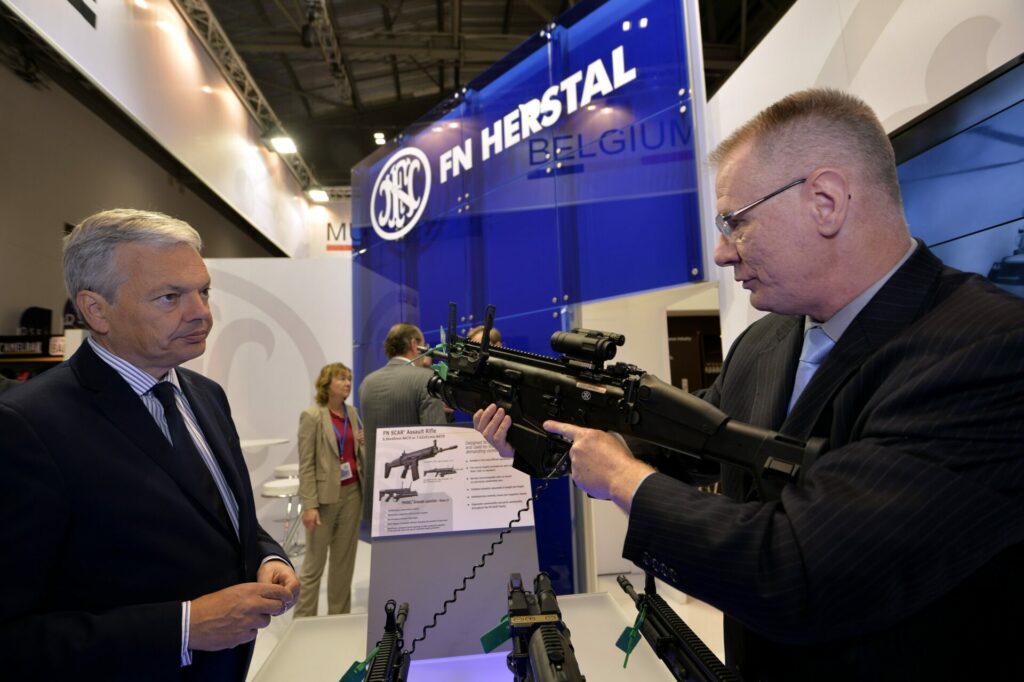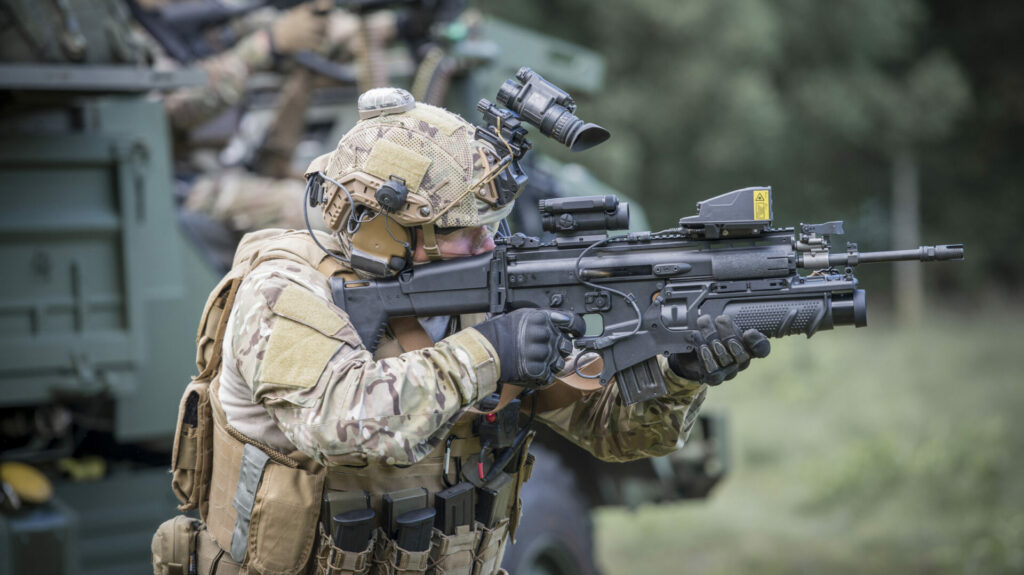Share prices for the world’s largest arms manufacturers are soaring and supply can hardly keep up with demand. Belgium, known in the arms trade for the companies FN Herstal and armoured vehicle manufacturer John Cockerill, is also seeing these pressures and financial gains.
Business is booming for weapons companies across the world thanks to the war in Ukraine and the international weapons build-up over fears of future Russian incursions into Europe, De Morgen reports.
Yet this raises questions about the morality of this industry boost. While weapons manufacturers make bumper profits from the sale of weapons, ordinary citizens bear the pain and misery of the largest war in Europe since World War 2.
Belgian war economy
Belgian Admiral Michel Hofman, Chief of Defence of the Belgian Armed Forces, explained that Belgium is transitioning “from a peace industry to a war industry.”
This surge in demand for military equipment is already being felt across Belgium. Even consumer gun shops, such as the Nikabi arms store in Averbode, Flanders, are facing problems in getting the supplies.
“Certain ammunition, such as the .22, is still difficult to obtain. Although the cases used for civilians are different from the military, they use the same powder and primers,” explained owner Nico Boeckx.
Boeckx often visits the wholesale of Belgian arms giant FN Herstal and describes how dozens of vehicles, presumably filled with weapons, were leaving one after another, he believes “To the Polish border.”
Belgium has its share of companies that supply military forces with vehicles, ammunition, service rifles, heavy weapons systems, aircraft parts, rocket munitions, and more to militaries across the globe. High overseas demand naturally has an impact on domestic availability of civilian-use munitions.
Belgium's regions in the spotlight
FN Herstal, which is part-owned by the Wallonia region, frequently come under fire for profiteering from conflict. The Belgian Council of State suspended the regional government’s arms export to Saudi Arabia on at least three separate occasions in recent years.
Evidence suggests that Belgian-made weapons were being actively used in fighting inside Yemen as part of the Saudi intervention in the Yemeni civil war, against terms set out by licences issued by the government.
Numerous war crimes have been reported and humanitarian groups in Belgium are now launching legal action against the FN Herstal group for potential complicity in these crimes.
The war in Ukraine has also massively bolstered the Flemish arms industry, though it is less developed than Wallonia’s.
According to the Flemish government’s monthly report on export licences, a total of €371.5 million in export licences were granted in the first six months of this year – already twice that of 2021 although the figure is largely accounted for by permits for the construction of F-35 fighter jets for the US and UK.
The Flemish region concluded one significant export arrangement with Ukraine that saw bullet-proof vests from Sioen Ballistics in Ardooie on behalf of a Flemish company with an office in Ukraine.
Flemish company Concordia Textiles, which supplies heavy fibres used in the manufacture of this type of vest, has reported production chain issues. “We have longer delivery times due to the increased demand,” the company told De Morgen.
As donations increase, demand for weapons grows
Weapons manufacturers and defence systems companies across the world have been swamped by the sudden demand. Ellen Lord, the Pentagon’s chief weapons buyer during the Trump administration, has warned that the war in Ukraine was putting major inflationary pressures on major weapons producers.
In May, CEO of British aerospace and defence company BAE Systems told investors that he saw “opportunities to further enhance the medium-term outlook” of the company in the context of the “elevated threat environment.”
Belgium is known to have made significant weapons donations to Ukraine but the government has not given any concrete numbers.
At the start of the war in February, Belgian Prime Minister Alexander De Croo announced that Belgium would donate 5,000 machine guns, 200 anti-tank weapons, and 3,800 tonnes of fuel to Ukraine. Since then, Belgium has donated additional anti-tank missiles.

Didier Reynders pictured at the FN Herstal stand during a visit to DSEI defence and security event. BELGA PHOTO ERIC LALMAND
Machine guns donated by Belgium were produced by FN Herstal, but came from existing government stocks. Images circulating online have shown members of Ukraine's Foreign legion using the machine gun platforms, as well as F2000 assault rifles.
Any stocks that get depleted, however, must be replenished. There is no evidence so far that Belgium has begun to order more weapons to replace those donated to Ukraine, but across the border in France, the government announced that it would order 18 new CAESAR self-propelled Howitzers to replace those sent to Ukraine.
Europe spends big on defence
The war in Ukraine has led to a massive boost in spending on military, as well as more general investments in the defence sector. In June, the Belgian Federal Government announced that it would invest €1.8 billion into research and development as part of its larger target of 2% of GDP defence spending.
Naturally, this will serve as a massive boost to Belgian defence manufacturers such as FN Herstal, John Cockerill, and Sonaca. To mark the announcement of the new R&D spending, Belgian Defence Minister Ludivine Dedondeer visited Liège-based John Cockerill and surveyed military target systems and cannon platforms.
This trend has been replicated across Europe and defence companies are viewed as a bullish investment in the medium-term. The share price of German weapons manufacturer Rheinmetall has soared, reaching its highest ever price throughout the spring. French company Thales has seen similar increases, and BAE Systems is up 40% from January.
Related News
- Belgium to add 10 billion euros to military spending budget
- Belgium's army will strengthen NATO's eastern border by land, air and sea
- Belgian army sets sights on more F-35 fighter jets
This spending may be good for Ukraine and even international defence corporations, but there are fears that both government investment in defence and excess profits made by weapons manufacturers are inappropriate against the backdrop of rapidly rising inflation, high energy prices, and declining household finances.
Ecolo, Belgium’s francophone Green Party, raised opposition to Belgium’s massive military investment plans in May, stating that protecting household finances and providing budgetary support for citizens should remain a priority.
“In the long run, these (defence) companies benefit from higher defence budgets, but these countries meanwhile face another problem: inflation,” Jean-Pierre Maulny, deputy director of the French Institute for International and Strategic Affairs told De Morgen.
“Households will also need support…The current priorities may no longer be priorities in a few months' time,” the expert warned.

